Canlı bir blogun sırrı basit: her şey yorumlarla ilgili! 💬
Blog yorumları yalnızca sitenizin aktif görünmesini sağlamakla kalmaz, gerçek sohbetler yaratır, topluluk oluşturur ve okuyucuların daha fazlası için geri gelmesini sağlar.
WPBeginner’da yorum bölümlerimizin hareketlendiğini görmeyi seviyoruz. Yorumcu yarışmaları düzenlemekten okuyucularımızla etkileşime geçmeye kadar, insanları konuşturmak için gerçekten neyin işe yaradığını öğrendik.
Sessiz blogunuzu ilgi çekici bir topluluğa dönüştürmeye hazır mısınız? Yazılarınıza daha fazla yorum almak için gerçekten işe yarayan 11 kanıtlanmış ipucunu paylaşacağız.

Okuyucuları Yorum Yapmaya Teşvik Etmek Neden Önemlidir?
Okuyucuları blog yazılarınıza yorum bırakmaya teşvik etmek çok önemlidir.
Yorumlar, gönderilerinizin sonunda yer alan kelimelerden daha fazlasıdır; içeriğinizin okuyucuların ilgisini çektiğinin kanıtıdır.
İnsanlar düşüncelerini paylaşmak için zaman ayırdığında, blogunuz tek yönlü bir sokaktan canlı bir sohbete dönüşür. Bu, içeriğinizin okuyucuların ilgisini çektiğinin ve kullanıcı katılımını teşvik ettiğinin kanıtıdır.
✋ Ve işte gerçekten harika olan kısım: yorumlar bağlantılar yaratır.
Yorumlar okuyucularınıza bir ses verir ve tartışmanın akmasını sağlar. Daha da iyisi, okuyucular birbirleriyle sohbet etmeye başladıklarında, kendilerini daha büyük bir şeyin, gerçek bir topluluğun parçası gibi hissetmeye başlarlar. Blog yazmak da bu değil midir zaten?
Ayrıca, geri bildirim için altın madeni gibidirler. Okuyucularınızın gerçekten ne düşündüğünü, neleri sevdiklerini (veya sevmediklerini) ve içeriğinizi nasıl daha iyi optimize edebileceğinizi anlamanıza yardımcı olurlar.
Son olarak, çok sayıda yorum içeren bir blog daha popüler ve güvenilir görünür. Arama motorlarına içeriğinizin değerli bir kaynak olduğu sinyalini verir – bu da SEO’nuza güzel bir destek sağlayabilir! 🚀
WordPress Blog Yazılarınıza Nasıl Daha Fazla Yorum Alabilirsiniz?
Artık yorumları teşvik etmenin blogunuzu daha ilgi çekici hale getirmenin harika bir yolu olduğunu biliyorsunuz. Aşağıdaki bölümlerde, WordPress blogunuzda daha fazla yorum almanız için size 11 ipucu göstereceğiz.
İşte bu makalede paylaşacağımız tüm ipuçlarına hızlı bir genel bakış:
- Allow Users to Subscribe to Comments
- Notify Users on Replies to Their Own Comments
- Keep Discussing Quality High with Comment Moderation
- Show Newest Comments First
- Turn on Comments for Old Posts
- Showcase Your Top Commenters
- Display Recent Comments
- Allow Users to Rate and Share Comments
- Notify Users When Their Comment is Approved
- Allow Users to Edit Comments in WordPress
- Get Better WordPress Hosting
- Bonus Tip: Running WordPress Contests
Hazır mısınız? Okuyucuları blogunuza düşüncelerini ve geri bildirimlerini bırakmaya nasıl teşvik edeceğinizi keşfedelim!
1. Kullanıcıların Yorumlara Abone Olmasına İzin Verin
Bir kullanıcı web sitenize bir yorum bıraktığında, yeni yanıt olup olmadığını görmek için geri dönmek isteyebilir.
Ancak, blogunuzu yer imlerine eklemezlerse veya adını hatırlayamazlarsa, sitenize geri dönmenin yolunu bulmakta zorluk çekebilirler.
Kullanıcılara WordPress yazılarınızdaki yorumlara abone olma şansı sunabilirsiniz. Bu şekilde, yeni bir yorum gönderildiğinde anında bildirim alacaklardır.
Bunu yaparak, sayfa görüntülemelerinizi ve web sitenizdeki yorum sayısını da önemli ölçüde artırabilirsiniz. Sonuç olarak, sitenizdeki tartışmalar daha ilgi çekici olabilir.
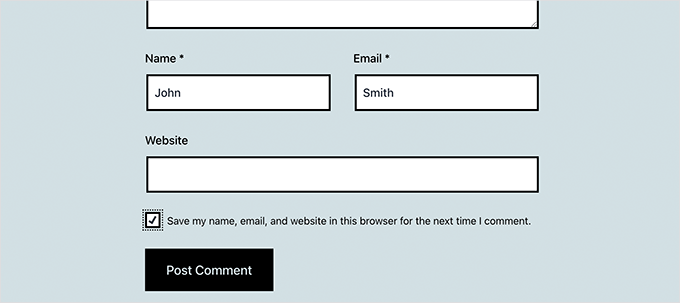
Thrive Themes paketinin bir parçası olan Thrive Comments eklentisi, WordPress sitenize kolayca yorum aboneliği özelliği eklemenizi sağlar.
Thrive ürünlerini kapsamlı bir şekilde test ettik ve bilmeniz gereken her şeyi ayrıntılı Thrive Themes Suite incelememizde bulabilirsiniz.
Thrive Themes web sitesine kaydolduktan ve eklentiyi sitenizde etkinleştirdikten sonra, bir e-posta pazarlama aracına bağlanarak ve API anahtarını girerek bildirimler için bir e-posta dağıtım hizmeti ayarlayabilirsiniz.

Daha fazla ayrıntı için WordPress’te kullanıcıların yorumlara abone olmasına nasıl izin vereceğinize ilişkin kılavuzumuza bakabilirsiniz.
2. Kullanıcılara Kendi Yorumlarına Gelen Yanıtları Bildirme
Bir kullanıcı sitenize yorum bıraktığında, sayfayı yer imlerine ekleyip daha sonra tekrar kontrol etmediği sürece herhangi birinin yanıt verip vermediğini anlayamaz. Ne yazık ki çoğu insan bunu yapmıyor.
Kullanıcıların kendi yorumlarına abone olmalarını kolayca sağlayabilirsiniz. Bu şekilde, birisi yorumlarına yanıt verdiğinde bir bildirim e-postası alacaklardır.
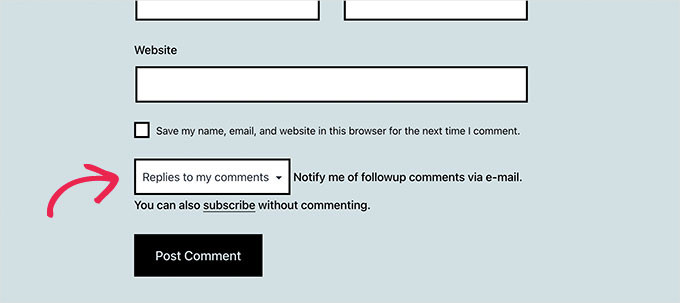
Ayrıca, sitenizdeki çoğu kullanıcı yorumuna yanıt vermeyi alışkanlık haline getirirseniz, daha fazla etkileşimi teşvik eder ve sohbeti devam ettirirsiniz.
Birisi WordPress’te yorumlarına yanıt verdiğinde kullanıcıları bilgilendirmek için Thrive Comments eklentisini kullanabilirsiniz.
✋ Ama önce Thrive Themes web sitesinde bir hesap açmanız gerekiyor.
Eklentiyi WordPress sitenizde etkinleştirdikten sonra, hem yorum yanıtları hem de yeni yorumlar için e-posta bildirimlerini özelleştirebilirsiniz.
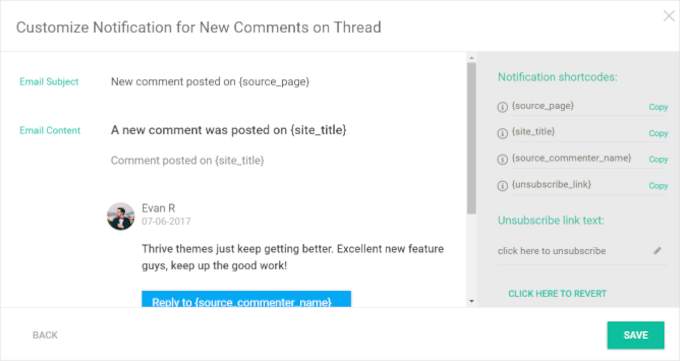
Ayrıntılı talimatlar için WordPress’te kullanıcıların kendi yorumlarına gelen yanıtları nasıl bildireceklerine ilişkin eğitimimize göz atabilirsiniz.
3. Yorum Moderasyonu ile Tartışma Kalitesini Yüksek Tutun
Yorumlarda kaliteli konuşmalar yapılmasını sağlamanın en iyi yolu WordPress’te yorum moderasyonunu etkinleştirmektir.
Yorum moderasyonu, yorumların blogunuzda görünmeden önce incelenmesi ve onaylanması sürecidir. Bu, yalnızca uygun yorumların okuyucularınız tarafından görülebilmesini sağlamanıza yardımcı olur.
Yorumları denetleyerek şunları yapabilirsiniz:
- Spam yorumların ve uygunsuz içeriklerin gönderilmesiniönleyin.
- Saygılı ve yapıcı bir konuşma sürdürün.
- Tartışmaya değer katan yorumları onaylayın.
WordPress’te, her yorumu yayına girmeden önce gözden geçirmek için yorum denetimini etkinleştirebilirsiniz. Bunu yönetici alanınızdan Ayarlar ” Tartışma bölümüne giderek açabilirsiniz.
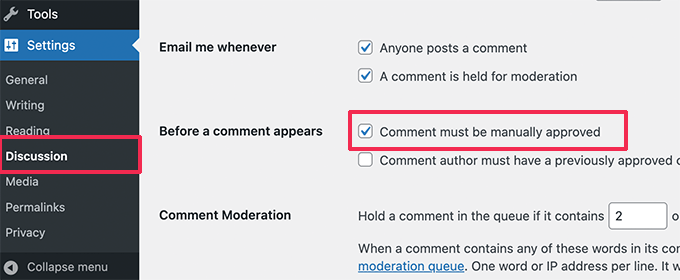
Yorum moderasyonu spam ve uygunsuz yorumları engellemenize yardımcı olurken, kullanıcılarınızla daha sık etkileşim kurmanıza da olanak tanır.
Yorumları inceleyip onayladığınızda, yanıtlamak ve okuyucularınızla etkileşim kurmak için zaman ayırabilirsiniz. Bu etkileşim onların kendilerini değerli hissetmelerini sağlayabilir ve daha sık yorum yapmalarını teşvik edebilir.
Thrive Comments, yorum moderasyonunu ayarlamak için en iyi seçimdir. Başlamak için Thrive Comments’i tek başına veya Thrive Themes Suite’in bir parçası olarak satın alabilirsiniz.
Kurulumdan sonra, yorumları filtreleme, atama ve öne çıkarma seçeneklerine sahip gelişmiş bir moderasyon arayüzü bulacaksınız.
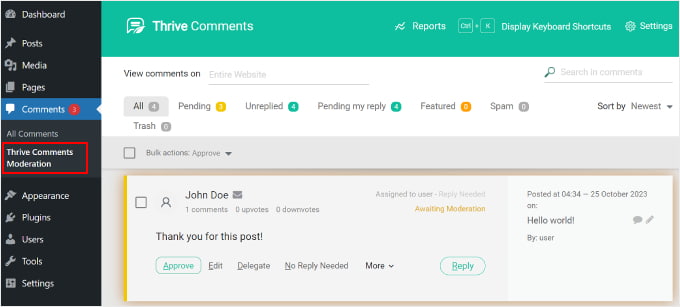
Ayrıca Thrive Comments, kullanıcı etkileşimini değerlendirmeye yardımcı olmak için yorum etkinliği hakkında ayrıntılı raporlar sunar.
Adım adım talimatlar için WordPress’te yorumları denetlemeye ilişkin başlangıç kılavuzumuza başvurabilirsiniz.
📢 Not: Bazı web sitesi sahipleri spam yorumları engellemek için CAPTCHA kullanır, bu kullanıcı dostu değildir ve genellikle normal kullanıcıları yorum yapmaktan caydırır. Bu nedenle sitenizde yorum moderasyonunu etkinleştirmenizi ve her bir yorumu manuel olarak onaylamanızı (gerekirse) öneririz.
4. En Yeni Yorumları Önce Göster
WordPress varsayılan olarak en yeni yorumu yorumlar listesinin en altında gösterir. Dolayısıyla, bir gönderide çok sayıda yorum varsa, kullanıcılar en eski yorumları en üstte görecektir.
Sıralamayı değiştirmek, okuyucularınızın en yeni tartışmaları ilk olarak görmelerini sağlar, bu da daha alakalı ve ilgi çekici olabilir. Ayrıca, geri dönen ziyaretçilerin eski yorumlar arasında gezinmeden yeni yorumları takip etmelerini kolaylaştırır.
Yorum sırasını en yeniden en eskiye değiştirmek için Ayarlar ” Tartışma bölümüne gidin ve ‘Diğer yorumlar ayarları’ bölümüne ilerleyin. Buradan, açılır menüden ‘daha yeni’ seçeneğini seçmek isteyeceksiniz.
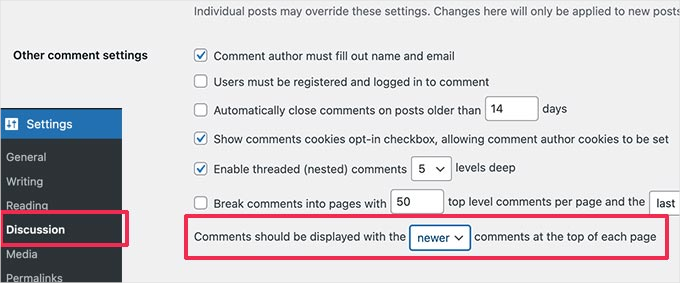
Daha fazla ayrıntı için, en son yorumların en üstte nasıl görüntüleneceğine ilişkin eğitimimize göz atmak isteyebilirsiniz.
5. Eski Gönderiler için Yorumları Açın
Çoğu blog yazarı, yorum spam’ini azaltmak için eski gönderilere yapılan yorumları kapatır. Ancak bu gönderilere yorum yapmak isteyen kullanıcılar olabilir.
Yorum moderasyonunu zaten kullandığınıza göre, eski gönderilere yapılan yorumları güvenle açabilirsiniz.
Ayarlar ” Tartışma bölümüne gidin ve ‘Diğer yorum ayarları’ bölümüne ilerleyin. ‘X günden eski makalelerdeki yorumları otomatik olarak kapat’ seçeneğinin yanındaki kutunun işaretini kaldırın.
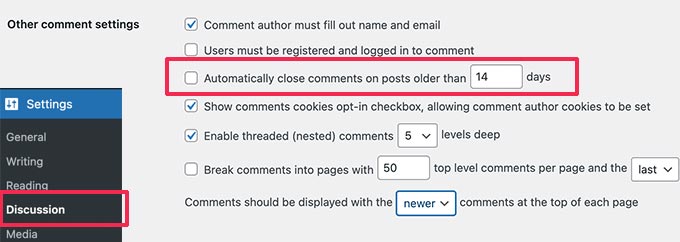
Ayarlarınızı kaydetmek için ‘Değişiklikleri Kaydet’ düğmesine tıklamayı unutmayın.
6. En İyi Yorumcularınızı Sergileyin
📝 Yasal Uyarı: 6. ve 7. ipuçlarında paylaşacağımız örnekler klasik bir tema kullanılarak test edilmiştir. Eğer bir blok tema kullanıyorsanız, adımlar farklılık gösterebilir.
En çok yorum yapanları öne çıkarmak, en sadık kullanıcılarınızı teşvik etmenin ve takdir etmenin iyi bir yoludur.
Bu, kullanıcılara blogunuzun topluluğunun bir parçası olduklarını ve yorumlarınıza hayat verme çabalarını takdir ettiğinizi gösterir.
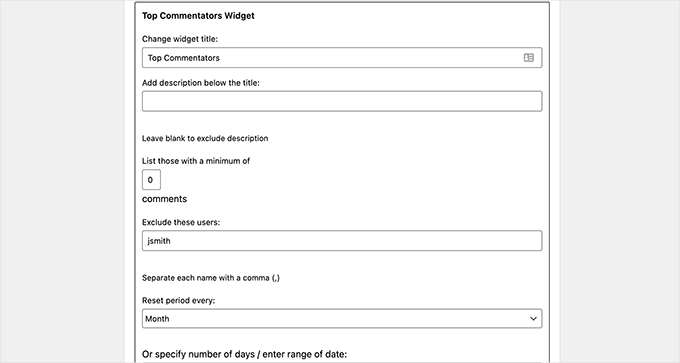
Örneğin, WPBeginner’da, En İyi Yorumcu yarışmamızın bir parçası olarak en iyi yorumcularımızı sergiliyoruz. Bu, insanları daha aktif bir şekilde katkıda bulunmaya teşvik ediyor ve okuyucularımız arasında eğlenceli bir rekabet ve katılım duygusu uyandırıyor.
En çok yorum yapanları göstermek için Top Commentators Widget eklentisini yükleyebilir ve etkinleştirebilirsiniz. Etkinleştirdikten sonra Görünüm ” Widget ‘lar bölümüne gidin ve ‘En Çok Yorum Yapanlar’ widget’ını bir kenar çubuğuna ekleyin.
Daha ayrıntılı talimatlar için WordPress kenar çubuğunda en çok yorum yapanları görüntüleme kılavuzumuza bakın.
💡 Uzman İpucu: Yorum etkileşimini artırmak için, belirli kilometre taşlarına ulaşan en iyi yorumcuları rozetlerle ödüllendirmeyi düşünün. Thrive Comments, bu oyunlaştırmayı ayarlamanıza yardımcı olabilir.
Sınırsız rozet oluşturabilir ve beğenme/beğenmeme işlevi ekleyebilirsiniz. Daha fazla ayrıntı için WordPress yorumları için sıralama sistemi ekleme eğitimimize bakın.
7. Son Yorumları Görüntüle
Kullanıcılar web sitenize ilk kez girdiklerinde, yorumlar bölümünüzde neler olup bittiği hakkında hiçbir fikirleri olmaz.
Örneğin, yeni bir gönderi hararetli bir tartışmaya konu olabilir ve kullanıcılar bu tartışmaya katılmak isteyebilir. Sitenizdeki son yorumları göstererek kullanıcıların en son tartışmaları takip etmelerine yardımcı olabilirsiniz.
Bunu yapmak için Görünüm ” Widget ‘lar bölümüne gidebilir ve Son Yorumlar widget’ını bir kenar çubuğuna ekleyebilirsiniz.
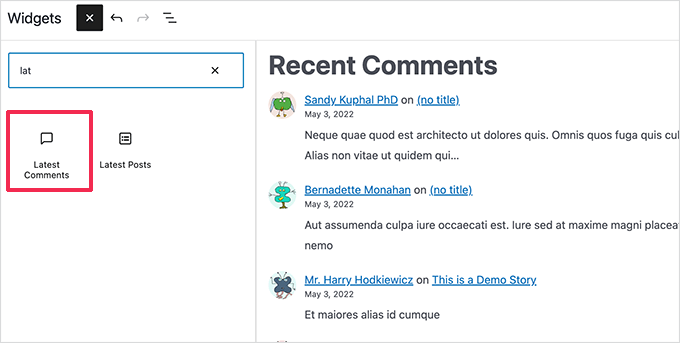
8. Kullanıcıların Yorumları Değerlendirmesine İzin Verin
Varsayılan WordPress yorum sistemi sade ve basittir. Modern bir tartışma platformunun sosyal, oyunlaştırma ve kullanıcı katılımı unsurlarına sahip değildir.
Ancak bu özellikleri eklentiler kullanarak WordPress’e kolayca ekleyebilirsiniz.
Örneğin, kullanıcıların bir upvote/downvote özelliği kullanarak yorumları derecelendirmesine izin verebilirsiniz.
Thrive Comments, kullanıcıların yorumları oylamasına izin vermek için en iyi eklentidir. Tek yapmanız gereken ‘Oylama ve Rozetler’ bölümündeki ‘Yukarı ve aşağı’ seçeneğini etkinleştirmek.
Bu, kullanıcıların WordPress’teki yorumları beğenmesine veya beğenmemesine olanak tanıyacaktır.
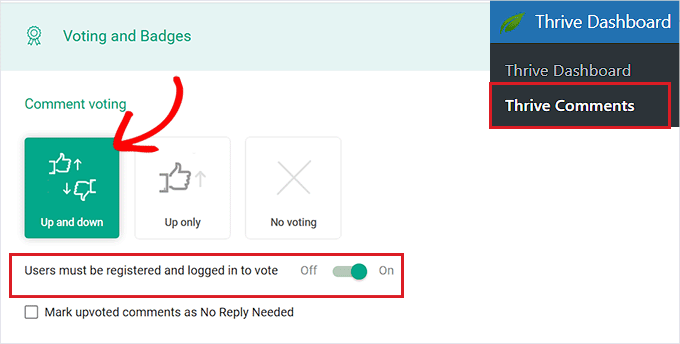
Yorumlarınıza yalnızca beğen düğmesini eklemek istiyorsanız, bunu da yapabilirsiniz! ‘Yalnızca yukarı’ seçeneğine tıklamanız yeterlidir.
Daha fazla ayrıntı için, WordPress’te kullanıcıların yorumları beğenmesine veya beğenmemesine nasıl izin vereceğinize ilişkin kılavuzumuzu okuyabilirsiniz.
9. Yorumları Onaylandığında Kullanıcıları Bilgilendirin
Yorum moderasyonunu etkinleştirirseniz WordPress, kullanıcılara yorumlarını blogunuza gönderdikten sonra yorumlarının moderasyon beklediğini gösterir. Ancak yorumlarının onaylanıp onaylanmadığını veya silinip silinmediğini bilemezler.
Kullanıcıları yorumları onaylandığında bilgilendirmek sayfa görüntülemelerini ve kullanıcı etkileşimini artırabilir.
Bunu yapmak için Comment Approved Notifier Extended ek lentisini yükleyebilir ve etkinleştirebilirsiniz. Etkinleştirildikten sonra, eklenti bir yorumu her onayladığınızda otomatik olarak bir e-posta bildirimi gönderir.
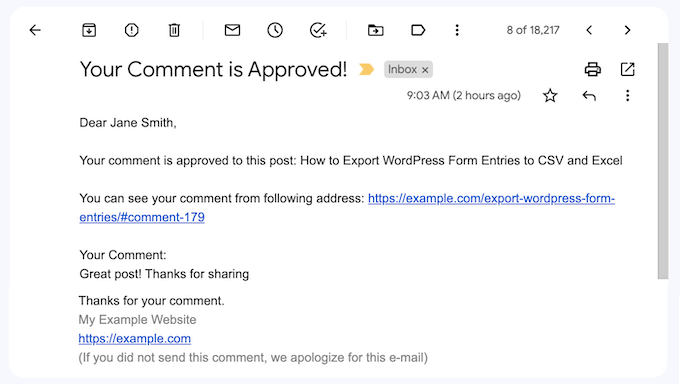
Daha fazla bilgi edinmek için, yorumlarını onayladığınızda kullanıcıları nasıl bilgilendireceğinize ilişkin adım adım kılavuzumuza bakabilirsiniz.
10. WordPress’te Kullanıcıların Yorumları Düzenlemesine İzin Verin
Varsayılan olarak, kullanıcılar yorumlarını gönderdikten sonra düzenleyemezler. Bu, bir yazım hatası veya dil bilgisi hatasını düzeltmek isteyebilecekleri için insanların canını sıkabilir.
Basit Yorum Düzenleme eklentisini kurun ve etkinleştirin. Kullanıcıların kendi yorumlarını kolayca düzenlemelerini sağlar ve düzenleme izni için bir zaman sınırı belirlemenize olanak tanır.
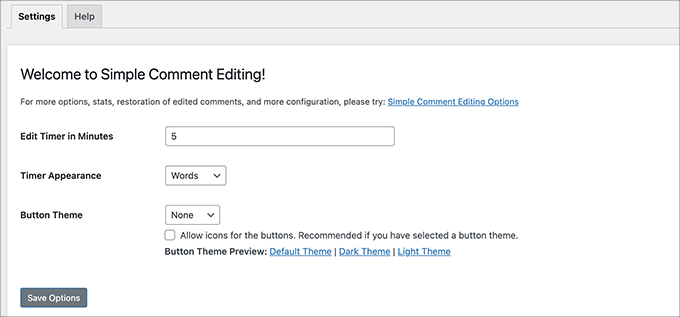
Ayrıntılar için WordPress’te kullanıcıların yorumları düzenlemesine nasıl izin vereceğinize ilişkin makalemize bakabilirsiniz.
11. Daha İyi WordPress Barındırma Hizmeti Alın
Yorumlar web barındırma sunucunuzdaki kaynakları tüketir ve bu da genel WordPress hızınızı ve performansınızı etkileyebilir.
Bir kullanıcı WordPress sitenize yorum gönderdiğinde, sunucunuz bir PHP betiği çalıştırır. Birden fazla kullanıcı aynı anda yorum gönderirse, bu durum sitenizi yavaşlatabilir, hatta çökertebilir.
Sitenizde daha fazla yorum almak için öncelikle web sitenizin bu etkileşimi kaldırabileceğinden emin olmanız gerekir.
Bununla başa çıkmanın kolay yolu bir WordPress önbellek eklentisi kullanmaktır. Bu, paylaşımlı bir WordPress barındırma sağlayıcısı üzerindeki çoğu web sitesi için işe yarayacaktır.
✋ Ancak, daha yoğun web siteleri için bu yeterli olmayabilir.
Daha büyük bir siteniz varsa, daha iyi hız için SiteGround veya Hostinger gibi yönetilen bir WordPress barındırma sağlayıcısını denemek isteyebilirsiniz.
Bonus İpucu: WordPress Yarışmaları Düzenlemek
WordPress sitenizde yarışmalar düzenlemek etkileşimi artırmak için harika bir yol olabilir.
Bunun için güçlü bir araç, hediye ve yarışmalar oluşturmak ve yönetmek için kullanıcı dostu bir eklenti olan RafflePress‘tir.
WPBeginner’da, çekilişlerimizi yürütmek için RafflePress’i kullanarak çok başarılı olduk. Platforma daha derinlemesine bakmak ister misiniz? Tam RafflePress incelememize göz atın.
Bu eklenti, web sitenizdeki farklı makalelere yorum yapmak da dahil olmak üzere yarışmalarınıza katılmak için farklı yollar ayarlamanıza olanak tanır.

Böylece okuyucularınızı daha fazla yorum bırakmaya teşvik etmiş olursunuz. Bu yalnızca yarışma katılımına yardımcı olmakla kalmaz, aynı zamanda sitenizdeki genel etkileşimi de artırır. Bu bir kazan-kazan!
İyi haber şu ki, RafflePress birden fazla giriş yöntemi eklemenize izin veriyor, böylece bunu bülteninize abone olmak, sosyal medyada bir gönderiyi paylaşmak ve daha fazlası gibi diğer eylemlerle birleştirebilirsiniz.
Daha fazla ayrıntı için WordPress’te RafflePress ile nasıl çekiliş/yarışma düzenleyebileceğinizi anlatan eğitimimizi takip edebilirsiniz.
Umarız bu makale WordPress blog yazılarınıza daha fazla yorum almanın yeni yollarını öğrenmenize yardımcı olmuştur. Daha sonra, WordPress yorum düzeninin nasıl şekillendirileceğine ilişkin kılavuzumuzu ve WordPress yorumlarını iyileştirmek için en iyi eklentiler hakkındaki uzman seçimlerimizi de görmek isteyebilirsiniz.
If you liked this article, then please subscribe to our YouTube Channel for WordPress video tutorials. You can also find us on Twitter and Facebook.





Dayo Olobayo
I’ve been struggling to get comments on my blog for a while. The suggestion to respond to every comment is something I’ll definitely implement. It seems like a great way to show readers that their opinions are valued and encourage more interaction. Thanks for sharing.
WPBeginner Support
You’re welcome!
Admin
Jiří Vaněk
using the WP discuz plugin helped me get more comments for one simple reason that you also write about. Reply notification. Once a user posts a comment and I respond to it, they get a notification and that usually prompts them to come back. Quite often he just writes thank you or something similar, but it increases the number of comments under the article, and if there is at least a little liveliness, many other users will join.
David Mitchell
These are some excellent tips for getting more comments on your WordPress blog posts! Here are a few more suggestions to further encourage engagement and discussion:
Ask engaging questions: At the end of your blog posts, pose thought-provoking questions that encourage readers to share their insights or experiences. This can spark conversation in the comments section.
Respond to comments promptly: Be active in responding to comments on your blog posts. Engage with your readers, answer their questions, and thank them for their input. This shows that you value their contributions and encourages them to comment more in the future.
Use a comment plugin: Consider using a comment plugin that enhances the commenting experience for your readers. Plugins like Disqus or wpDiscuz offer features like threaded comments, social media login integration, and notifications, making it easier for readers to engage with your content.
Implement gamification: Add a gamification element to your comments by using plugins that allow users to earn points or badges for their contributions. This can incentivize readers to comment more frequently and increase overall engagement.
Encourage sharing on social media: Include social sharing buttons at the end of your blog posts, allowing readers to easily share the post on their preferred social platforms. This can help expand the reach of your blog post and bring in more readers and potential commenters.
Remember, creating a welcoming and engaging environment is key to fostering more comments. By implementing these strategies and actively participating in discussions, you can encourage your readers to get involved and share their thoughts on your blog posts.
WPBeginner Support
Thank you for adding these recommendations
Admin
Salem
Does the comment improve my SEO ?
WPBeginner Support
Comments are not for SEO, they are for community interaction
Admin
malika
Thank you for sharing information!
WPBeginner Support
You’re welcome
Admin
Ali Hassan
Nice post keep sharing such a wonderful post
WPBeginner Support
Thank you
Admin
Lori
Correct me if I’m wrong, won’t adding all these plugins slow down your website?
WPBeginner Support
Not all plugins will have a noticeable change to your site’s speed, you would want to take a look at our article: https://www.wpbeginner.com/opinion/how-many-wordpress-plugins-should-you-install-on-your-site/
Admin
Lori
Thank you.
Bill Gates
yep!
sameer
Hi Thanks for such a great content you together. I additionally have experienced an awesome method for learning and they have made the whole procedure incredibly straightforward and educational.
Jolie
I read this blog almost daily since I signed up and I constantly find new plugins/tools/ideas to add to my site. thank you so much!
Johnpaul Onwueme
Every aspect of this article is very helpful. You took your time to arrange it and it is also simple to understand. thank you so much
Munna Hossain
Nice article. Comments are really important for any blog. After publishing a good content you must want to get a good feedback. Comment is an excellent indicator of your performance. Thanks for your helpful article.
Sal Rosso
Very helpful and useful article for every blogger, Thanks for sharing such type interesting article.
Faylinn
I have a WordPress account and I’m kind of struggling with it because nobody ever comments. I allow my users to subscribe to comments, but it seems like I need to be doing a lot more. What can I do to actually get people to comment on my blog and participate in the conversation? There are literally no comments for me to even showcase.
WPBeginner Support
Keep writing useful content and engage with audiences on social platforms. Consistency and patience are the key to success.
Admin
waqas arif
an informatic article for beginners.hope these tricks works on my blog.thanks to share.
Mahesh
With these plugins, I am sure I will get more comments on my site. I have enabled the de:comments plugin now and also installed Comments Approved. Thanks for sharing. you guys have made my task easier.
Grant Winney
Great point about responding to comments. You can’t respond to everyone, especially on a busy blog, but why some authors allow comments but never respond to any of them (as I’ve seen on some blogs) is beyond me. The whole fun of blogging is knowing read what you wrote and learned something from it, or otherwise felt it worthy enough to engage in a discussion.
Penelope Silvers
I agree with Grant. I’ve left comments on sites that have no replies on them. It’s like crickets and I have no desire to return. The fun of leaving a comment is interacting with the host. Like a party!
Asim Awan
Nice and informative post to boost comments. What’s your opinion about using Disqus commenting system instead of WordPress Comments?
WPBeginner Support
Take a look at switching away from Disqus review – Increased comments by 304%
Admin
Julius
I don’t like Disqus at all. I don’t like to leave a comment on the site that uses Disqus as well!
Aazar
nice post but not much as your blog reputation…!
Naveen
Hey what do you mean by reputation here?
This site is mostly beginners only and this article focused to beginners who are looking for comments usage. I can say this is the best article about the comments.
Andrew Hansen
Good advice, I already do most of it on my small, personal faith, politics and culture blog (The Uncovered Lamp) but may use some of the advice. I use the askimet plugin for spam along with Wordfence premium’s anti-spam scanning.
To get more readers and then commenters I try to take part in comment threads on facebook to topics relevant to what i talk blog about and if relevant link to my post on the subject. I may have to check out the plugin for notifying people when their comment has been approved
Editorial Staff
Thanks for commenting Andrew. Yes linking to your site in other discussions (when relevant) is great for growing your audience.
Admin
Mladen
I have learned a lot from your articles, and I am thankful for that. But you comments unsubscribe system isn’t working and you better check it out.
Dennis Verdonschot
What about Facebook comments?
Lot’s of people stay constantly logged in Facebook.
My small blog got it’s first few replies soon after I added them.
Editorial Staff
I added Facebook comments on my site and the engagement wasn’t as high as I thought it would be. Plus you can not retain them 100% also it’s hard to moderate.
-Syed
Admin
Mary Jo Campbell
This was very helpful! Thank you. I plan to add widgets for Recent comments and Comments approved. Love this site! You guys make WordPress so easy to use and customize!
Editorial Staff
Thank you Mary
Admin
Carrie HeartCore
Hmmmm interesting article. I might have to try some of these tricks on a few test projects that I am running.